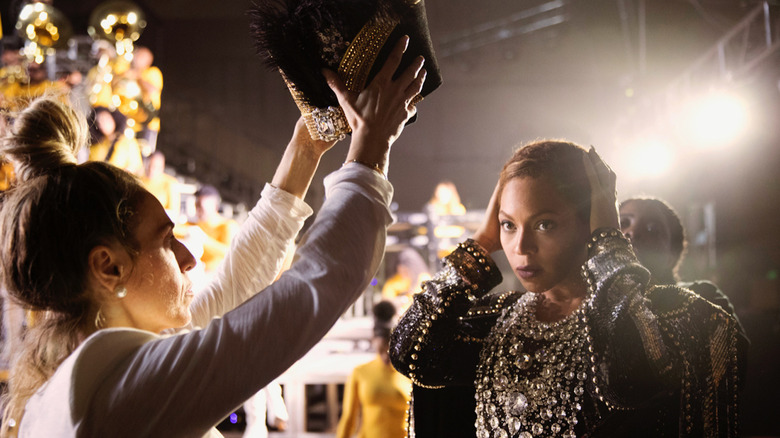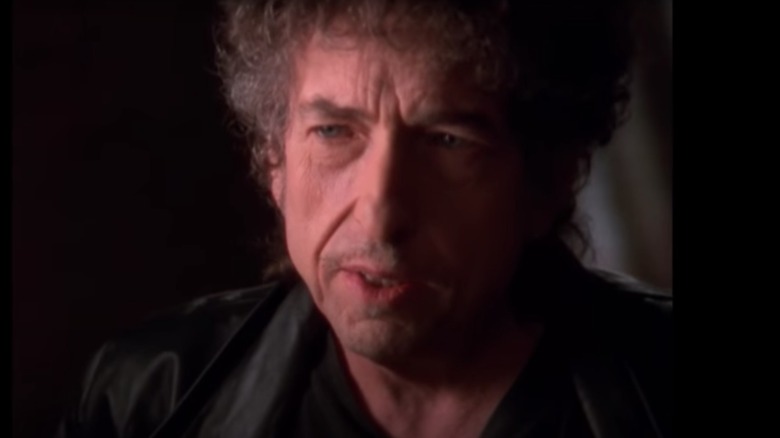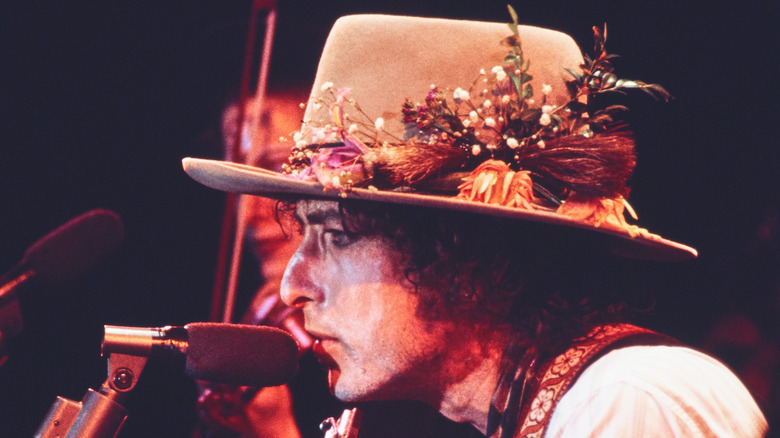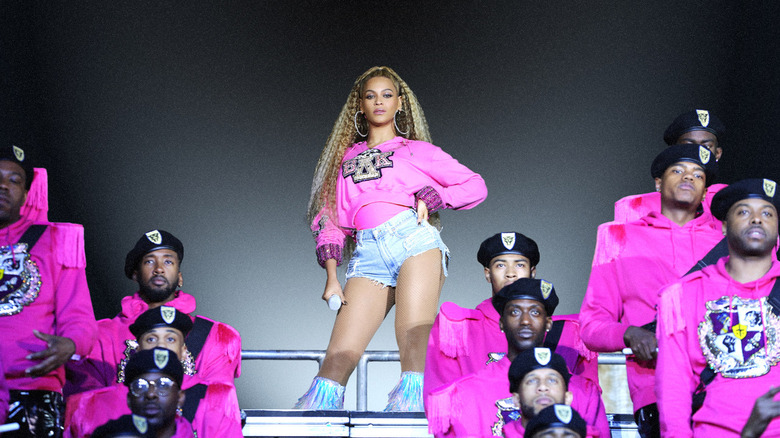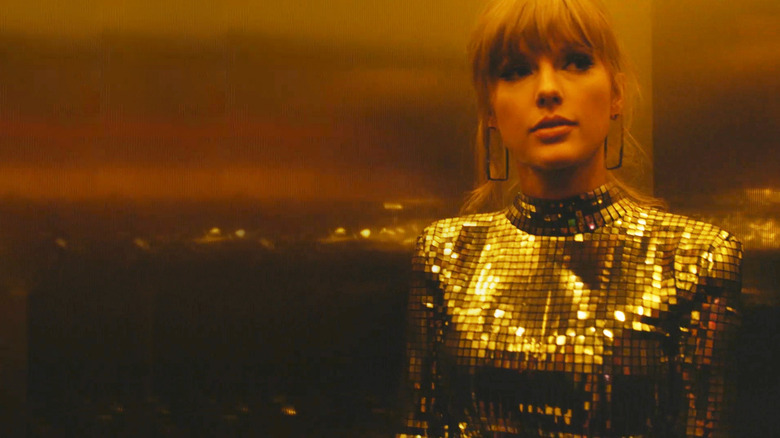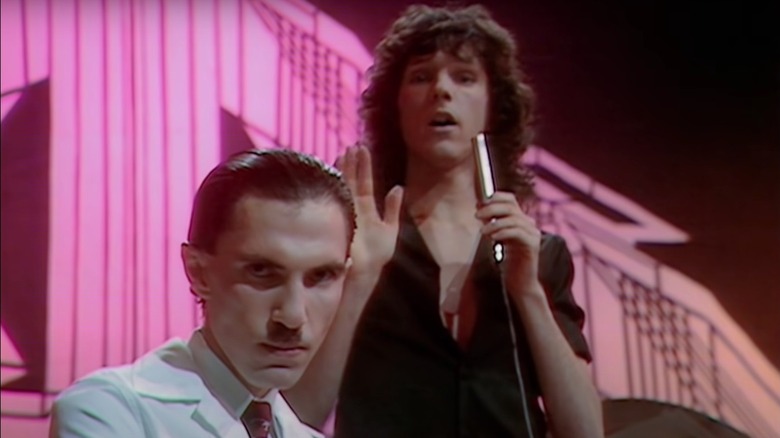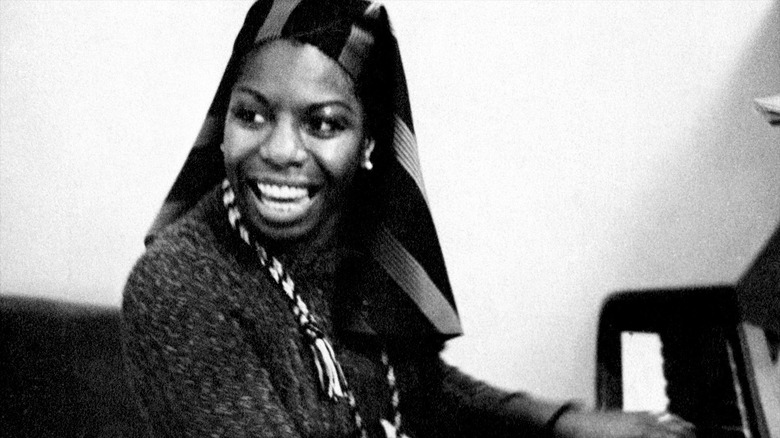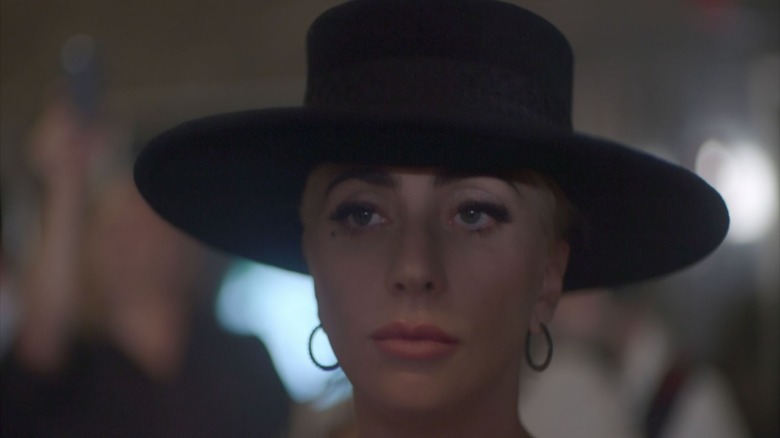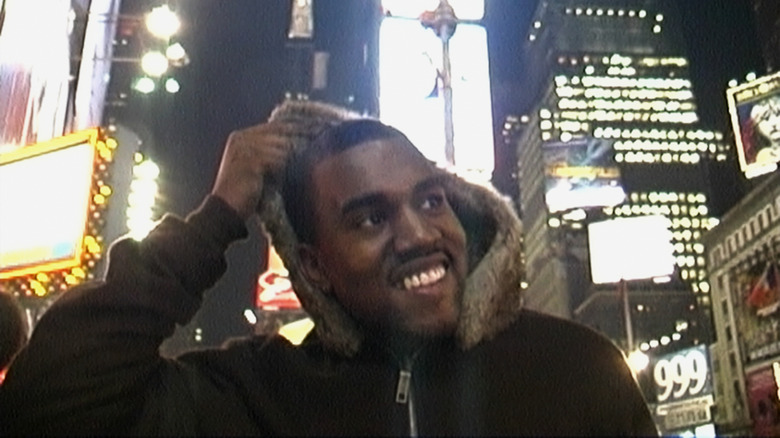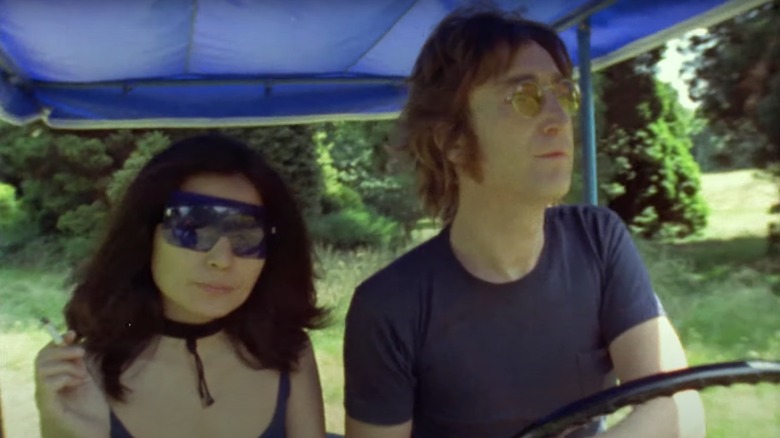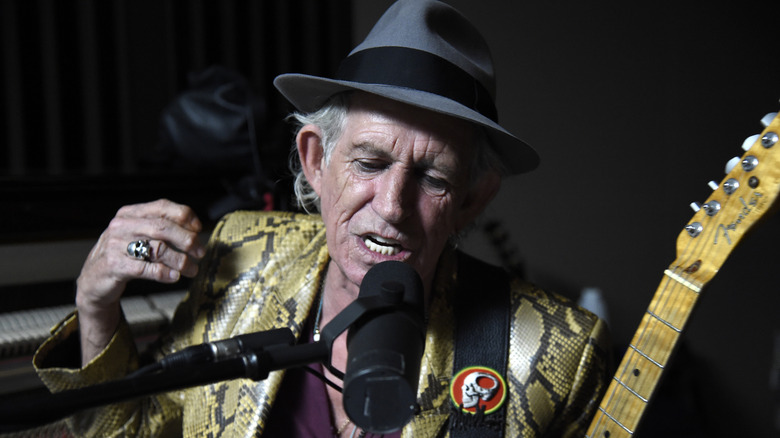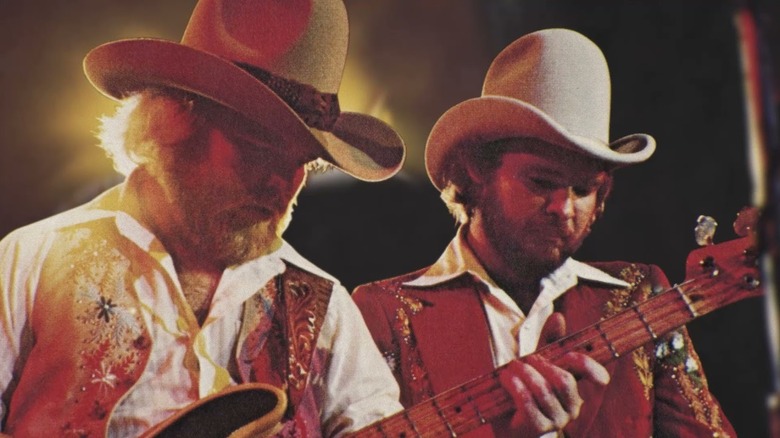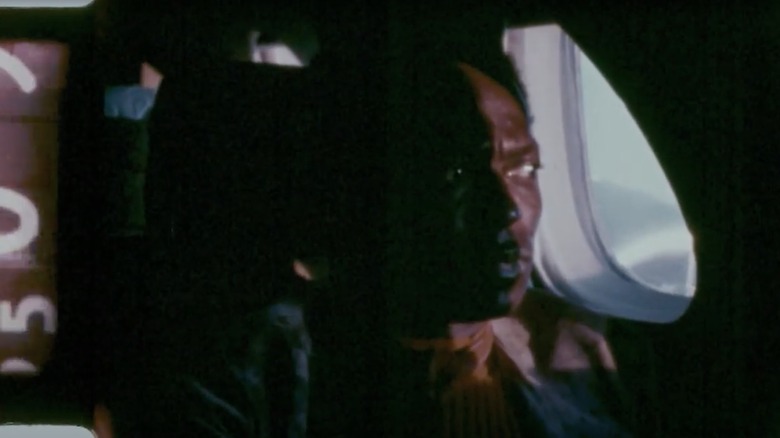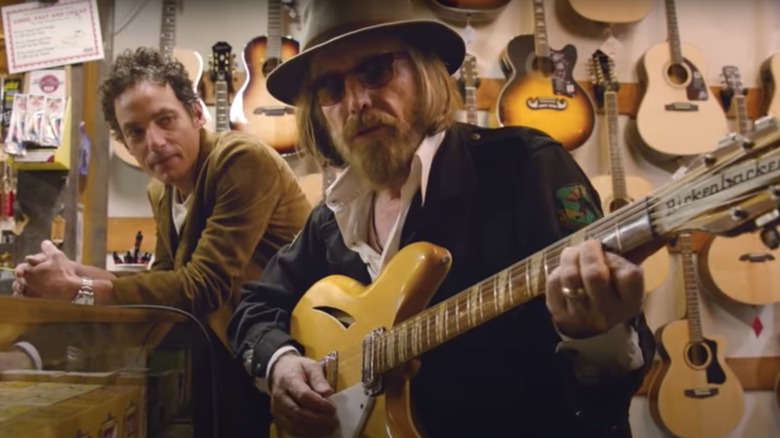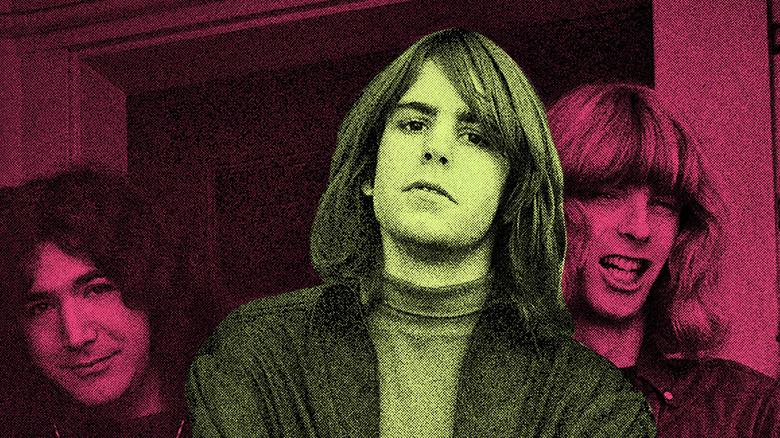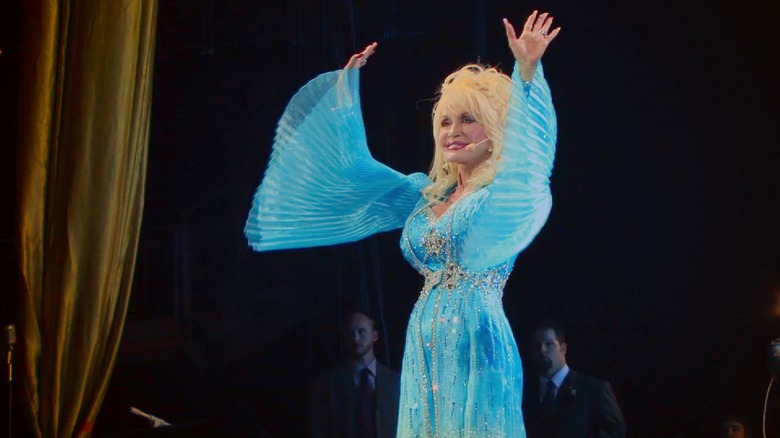15 Music Documentaries You Can Stream On Netflix Right Now
We may receive a commission on purchases made from links.
Music documentaries can run the gamut, and that's certainly true of those that are available to stream on Netflix. Regardless of whether one's interest lies in classic rock, contemporary pop, Nashville country, or vintage jazz, a scroll through Netflix's offerings reveals a wealth of viewing choices.
Looking for a critically acclaimed look at an obscure band that has managed to build up a loyal fanbase while avoiding mainstream success? You're covered. How about a documentary about legendary folk-rock icon Bob Dylan? No problem. In fact, Netflix actually has two diametrically different Dylan docs, both directed by the same acclaimed filmmaker. It's safe to say that Netflix offers such a wide breadth of music docs that there is truly something to meet nearly every musical taste. For proof, read on for a look at the diversity to be found within these 15 music documentaries you can stream on Netflix right now.
No Direction Home (2005)
Within the pantheon of Martin Scorsese's critically acclaimed films, the director is responsible for "The Last Waltz," generally regarded as one of the all-time great concert films. So when news emerged in the early 2000s that Scorsese would be helming a documentary about Bob Dylan for the PBS "American Masters" series, expectations were understandably sky-high. Those expectations were met and then some with "No Direction Home: Bob Dylan," a three-and-a-half-hour deep dive into the life and legend of the iconoclastic singer-songwriter who managed to become one of the planet's most famous celebrities and, simultaneously, one of its most enigmatic. Featuring a wealth of archival material and electrifying concert footage from various stages of Dylan's career, the doc also boasts Dylan's first full-length on-camera interview in more than two decades.
Accepting the 2005 Peabody Award for the film, Scorsese explained that a big goal was "to make a film about music in which you really hear music." The director also wanted to tell "the story of the times" that shaped Dylan, from his early life in rural Minnesota to the tumultuous 1960s in which he achieved a level of stardom that bordered on deification. The film earned Scorsese some of the best reviews of his career (and that's saying something!). Looking back at the documentary more than a decade later, Decider praised "No Direction Home" as both "one of the best rock documentaries of all-time" and possibly "the best film Scorsese has made this century."
Rolling Thunder Revue: A Bob Dylan Story (2019)
Nearly 15 years after making the definitive Bob Dylan documentary, Martin Scorsese turned his attention to Dylan once more with "Rolling Thunder Revue: A Bob Dylan Story." This time, he focused on Dylan's famed 1975-1976 tour, a shambolic traveling carnival featuring a revolving roster of performers that ranged from Joni Mitchell to Patti Smith to poet Alan Ginsberg. Along with some stunning concert performances, Scorsese features fascinating behind-the-scenes footage, culled from outtakes shot for a movie Dylan was filming at the time called "Renaldo and Clara."
Yet Scorsese wasn't content to present a straight-up documentary, injecting a variety of made-up nonsense into the film. That's most evident in the interview with Stefan Van Dorp, purportedly the director responsible for shooting the footage, but is actually actor Martin von Haselberg (husband of Bette Midler) as the fictional character. Then there's Sharon Stone, who claims to have been accompanying Dylan on the tour (she didn't). There's politician Jack Tanner, who is actually actor Michael Murphy as the fictional character he played in Robert Altman's miniseries "Tanner '88." Even more confusing is an interview with actual entertainment exec Jim Gianopulos, who claims to have been the tour's financial backer. He wasn't but relays some wild anecdotes that are as entertaining as they are bogus. Dylan is in on the joke, dissing Van Dorp and discussing his affair with Stone in interviews that further blur the line between fact and fiction, which appears to be Scorsese's point.
Homecoming: A Film by Beyoncé (2019)
Produced for Netflix, "Homecoming: A Film by Beyoncé" showcases Queen Bey as she prepares for her 2018 headlining set at Coachella, a performance that's been described as "a gobsmacking marvel of choreography and musical direction," and "one of the most precise, demanding, and altogether staggering performances by any musician on a national stage in recent memory." Not only does "Homecoming" showcase the two performances she gave at Coachella, but the documentary (which Beyoncé co-directed with Ed Burke) also takes viewers on a deep inside journey into the intense preparation that went into that act. The doc also illustrates the audacity of her ambition as she mounts an extravagant stage show featuring 200 performers while also ensuring the whole thing remained shrouded in secrecy.
Meanwhile, it's not lost on Beyoncé that she's the first Black woman to headline Coachella in the festival's history, and she exudes a steely determination to use that platform to make a statement for the ages. Of course, critics may quibble about just how much of a documentary "Homecoming" actually is. As the director, Beyoncé is in the driver's seat, showing viewers only as much of herself and her creative process as she wants them to see. Ultimately, though, the film is both a celebration for fans and a form of communion for those who worship at the altar of music and, as The Guardian's Jake Nevins declared in his review, "one of the all-time great concert docs."
Miss Americana (2020)
While Taylor Swift didn't direct "Miss Americana," watching the made-for-Netflix documentary makes it clear that she may as well have. Like Beyoncé, Swift has carefully crafted her public persona, and director Lana Wilson pulls off a tricky balancing act that comes with directing a documentary about a star who also holds creative control. As Owen Gleiberman wrote in his review for Variety, "Miss Americana" is "a controlled and sanded-off confection of pop-diva image management" that also sees Swift opening up in a way that "is just sincere enough to lure us in."
"Miss Americana" also shows Swift as an artist trying to break out of the box that her mainstream popularity has placed her in. In one scene, she expresses regret that she remained apolitical in 2016, wishing she had ignored the advice of her management to steer clear of politics so she could have led her army of Swifties to mobilize against Donald Trump. While it's a no-brainer that Swift's fans will be mesmerized by "Miss Americana," the film offers just enough insight for casual fans — or even non-fans — with Swift revealing herself in candid moments as a woman navigating the complexities of superstardom while struggling to stay true to herself. When Joni Mitchell sang about "stoking the star-making machinery behind the popular song" 50 years earlier, "Miss Americana" presents a solid argument that little has changed for female artists in the years since then.
The Sparks Brothers (2021)
Since forming in 1971, Sparks has teetered on the edge of rock obscurity, maintaining enough of a cult following to keep the band going for a solid half-century. Sparks is the quirky brainchild of brothers Russell and Ron Mael, with their lifelong musical partnership forming the basis for the 2021 documentary "The Sparks Brothers." Not only is this the first film ever made about the iconoclastic duo, but it's also the first documentary by British director Edgar Wright, whose films include "Shaun of the Dead," and "Baby Driver." In "The Sparks Brothers," Wright wears his uber-fandom on his sleeve, as do the celebrity fans interviewed in the doc, an eclectic assortment that includes Sex Pistols guitarist Steve Jones, song parodist extraordinaire "Weird Al" Jankovic, Red Hot Chili Peppers bassist Flea, and fantasy author Neil Gaiman, to name just a few.
As reviewer Mark Kermode wrote in The Guardian, the film is something of a match made in heaven, given that it "teams the Maels with a director whose absurdist slapstick sensibility perfectly matches their own." As a result, "The Sparks Brothers" manages to be both a love letter to one of music's strangest groups while offering a weirdly satisfying introduction to Sparks' outlandish musical output that demonstrates why the loyalty of their fanbase is as fierce as it is small.
What Happened, Miss Simone? (2015)
Nina Simone had one of those voices that was instantly recognizable, with her distinctive vocal prowess on display in such classics as "Mississippi Goddam" and "To Be Young, Gifted and Black." The 2015 documentary "What Happened, Miss Simone?" takes an unvarnished look at the life and musical career of the legendary jazz singer. Using a wealth of archival performance footage combined with interviews with family members, close friends, and musical collaborators, the true genius of Liz Garbus' deft direction lies in letting Simone tell her own story in her own words, via interviews that Simone gave prior to her 2003 death and excerpts from the diary she kept.
While the film hits the high points of Simone's career and her eventual role as a civil rights activist after becoming politically radicalized in the 1960s, it also pulls no punches when delving into the psychological instability that dogged her (she was diagnosed as bipolar in the 1980s, when she was already in her fifties). Arguably the most telling moment in the film comes from an interview with Simone's daughter, Lisa Simone Kelly (as recounted in a Los Angeles Times review):
"My mother was Nina Simone 24-7, and that's where it became a problem. When the show ended she was alone, fighting her own demons, full of anger and rage. She couldn't live with herself, and everything fell apart."
Gaga: Five Foot Two (2017)
Much like Netflix's Taylor Swift doc "Miss Americana," the streamer's 2017 look at Lady Gaga was filmed with the full cooperation of and (it can be assumed) control over what made it into the finished product. Keeping that in mind, "Gaga: Five Foot Two" still offers plenty of revelatory moments. Filmed while Gaga recorded, released, and then promoted her fifth studio album "Joanne," director Chris Moukarbel ("Banksy Does New York"), who also served as cameraman, has seemingly mastered the art of becoming invisible enough to capture some unguarded moments that offer insight into the erstwhile Stefani Germanotta.
These private moments — such as when she accompanies herself on piano to serenade Tony Bennett with a haunting rendition of "Bad Romance" at his 90th birthday party — find her grappling with an unfulfilling personal life that is at direct odds with her professional success. At one point (via The Guardian), she gets candid about her private loneliness: "I'm alone, every night," she laments. "I go from everyone touching me all day and talking at me all day to total silence." Ultimately, what emerges in "Gaga: Five Foot Two" is a portrait of a determined and ambitious artist who is in total control of both her art and her image, regardless of the personal price paid.
Jeen-Yuhs: A Kanye Trilogy (2022)
There aren't too many documentaries that can claim to have been more than two decades in the making, yet that's the case with "Jeen-Yuhs: A Kanye Trilogy." The three-part documentary is the result of co-directors Clarence "Coodie" Simmons and Chike Ozah, who first began filming Kanye West when he was starting out as a rapper in the late 1990s. Divided into three "acts," the first two — titled "Vision" and "Purpose" — document his early days in Chicago, his move to New York City, and his multiplatinum breakthrough as a force to be reckoned with in the music scene.
Those first two parts capture West's enthusiasm, passion, and sheer talent, as the underdog rapper strives to become the biggest hip-hop artist on the planet ... and actually succeeds. It's the third part, "Awakening," where "Jeen-Yuhs" loses focus, and understandably so. After the runaway success of "College Dropout" catapulted West to unimagined heights of fame, he became far less accessible to the filmmakers. As a result, pointed out Pitchfork's Jayson Greene in his review, viewers receive little insight into the many, many controversies that have come to overshadow West's career in recent years, which are either skimmed over or referenced at such a lightning pace as to be negligible. It's in telling the story of West's rise that the movie really succeeds. Despite the shortcomings of Act III, "Jeen-yuhs" is a compelling look at the formative years of an artist who's shaped the musical landscape like few others.
John & Yoko: Above Us Only Sky (2018)
Now that Peter Jackson's exhaustive Beatles documentary "Get Back" has refuted the long-held view that Yoko Ono broke up the Fab Four, it also provides a fresh perspective when watching "John & Yoko: Above Us Only Sky," the 2019 doc focusing on her all-encompassing relationship with John Lennon. Directed by Michael Epstein ("The Battle Over Citizen Kane"), the film begins by examining the couple's respective childhoods before diving into the many ways in which they influenced each other, including artistically and politically, which was evidenced in their fervent anti-war activism.
In addition to a wealth of archival footage filmed in 1971 as the two worked on Lennon's "Imagine" album, "John & Yoko: Above Us Only Sky" also features an array of interviews, ranging from art curator John Dunbar (a mutual friend who organized Ono's art exhibit at which she and Lennon first met) to the guy who helped design and build the recording studio in their Tittenhurst Park estate. In many ways, the doc is actually a fitting companion piece to "Get Back," depicting the couple as ambitious young artists collaborating on new ways to redefine their own lives as art. Not surprisingly, the song "Imagine" looms large, something Ono addressed in a statement about the film that she gave to Rolling Stone: "I feel in the big picture the fact that John and I met — was to do this song," she stated.
Keith Richards: Under the Influence (2015)
There have been various documentaries produced about The Rolling Stones, but it wasn't until 2015 that guitarist Keith Richards agreed to have one made about him, the Netflix-produced "Keith Richards: Under the Influence." Just as the definitive Stones documentary has yet to be made, the same can be said about Richards, because as enjoyable as "Under the Influence" is, it's heavy on charm but light on insight. Rather than produce a biographical look at Richards, director Morgan Neville ("20 Feet from Stardom") is content to sit back and listen to his stories. The result is a certain intimacy, leaving viewers to feel like they're hanging out with the rock legend as he spins entertaining anecdotes from his well-worn life. That, however, is about as deep as it goes ... and there's nothing wrong with that.
Richards is a man with a keen self-awareness of the outlaw-rogue image he's curated for so many decades and is happy to add to the legend without offering private revelations that might not fit. Perhaps most appealing for fans is the rare glimpse the film provides into his creative process in the recording studio, as he and his band The X-Pensive Winos record their 2015 album "Crosseyed Heart." Noel Genzlinger summed it up fittingly in his review for the New York Times, writing that the movie "leaves you feeling as if there were more to Mr. Richards than it has captured."
ZZ Top: That Little Ol' Band from Texas (2019)
There's no argument that the career of Texas rock trio ZZ Top peaked in the 1980s with their massively successful "Eliminator" and "Afterburner" albums, yet the band's story is far longer and significantly deeper than that brief-yet-memorable period in their five-decade history. That comes through loud and clear in "ZZ Top: That Little Ol' Band from Texas."
In fact, director Sam Dunn's 2019 doc introduces viewers to the men behind the beards: guitarist/frontman Billy Gibbons, bassist Dusty Hill (who died in 2021 at age 72), and drummer Frank Beard who (in the greatest of ironies) is the sole band member without a beard. Featuring an array of concert footage, noted in John Defore's review in The Hollywood Reporter, the doc also features extensive interviews with the band members and celebrity fans such as Billy Bob Thornton and Black Keys frontman Dan Auerbach. As the group soldiers on without Hill (Elwood Francis, the band's one-time guitar tech was brought in as replacement bassist), "ZZ Top: That Little Ol' Band from Texas" stands as a fitting tribute to the blues-based trio responsible for such classic-rock party hits as "Gimme All Your Lovin'" and "Sharp Dressed Man."
Mile Davis: Birth of Cool (2019)
Trumpeter Mile Davis was a towering figure in the world of jazz, with a stunning musical output that spanned six decades, and a personal life that can charitably be described as turbulent. Originally produced for the PBS "American Masters" series, "Miles Davis: Birth of the Cool" may take a fairly conventional storytelling approach to profile a very unconventional musician, yet remains eminently watchable.
Along with the usual archival footage — some of which had never been seen before — director Stanley Nelson brings perspective to the story of Davis, who died in 1991. As the film makes clear, Davis was a study in contradictions. He was a musical taskmaster who demanded perfection from others while maintaining his own Herculean appetite for drugs and alcohol. He was also a lover of women who, for various reasons, treated them terribly. While the film revels in the musician's many triumphs, by no means is it hagiography, taking a warts-and-all look at an uncompromising visionary whose dark side both fueled his ambition and short-circuited his own success.
Echo in the Canyon (2018)
While Andrew Slater is the director of "Echo in the Canyon," this is clearly Wallflowers frontman Jakob Dylan's movie. In addition to serving as the film's executive producer, Dylan plays host and musical guide in this star-studded tribute to the music scene that sprang from Los Angeles' Laurel Canyon during the late 1960s. The result is part documentary and part performance film, with Dylan enlisting a cadre of musical contemporaries including Fiona Apple, Beck, Norah Jones, and more to perform new versions of classic rock songs from that scene, ranging from Crosby, Stills & Nash's "Questions" to The Mamas and the Papas' "Go Where You Wanna Go."
Is "Echo in the Canyon" a definitive look at the Laurel Canyon scene? Hardly. That honor goes to the 2020 docuseries "Laurel Canyon." What the film does offer, however, is star power and lots of it. Among the many musical legends to appear are Jackson Browne, Ringo Starr, Neil Young, David Crosby, Roger McGuinn, Brian Wilson, Eric Clapton, Neil Young, and the late Tom Petty, making what would be his final screen appearance. For fans of the music that emanated from that scene, "Echo in the Canyon" is an enjoyable exercise in nostalgia, focusing on both the music and the people who created it. "It's about the songs but it's also about the characters," Dylan explained in an interview with the Evening Standard. "I learned a lot being led along by these great artists."
The Other One: The Long Strange Trip of Bob Weir (2014)
As fans of The Grateful Dead are well aware, it took the tragic death of Jerry Garcia for Bob Weir to emerge from the former's shadow, something he's done admirably as leader of the touring dynamo that is Dead & Company. "The Other One: The Long Strange Trip of Bob Weir" — which came out in 2015, the same year Dead & Company launched its first tour — makes a compelling argument that Weir's uniquely understated style of guitar playing was equally as important to the band as Garcia's distinctive fretwork.
Mike Fleiss, creator of "The Bachelor," may seem an odd choice to direct a documentary about Weir, but the veteran Deadhead does an exemplary job to tell Weir's story authoritatively, beginning when the 16-year-old hippie met Garcia and changed both their destinies. Along with the requisite concert footage from various stages of the Dead's career, Weir himself offers much insight into the brotherly relationship he had with Garcia, and the mixture of pain and guilt he felt watching — and, he admits, contributing to — the drug-fueled self-destruction that led to Captain Trips' death at age 53. All in all, "The Other One" is a labor of love that serves as both a companion and counterpoint to "Long Strange Trip," Amazon Prime Video's definitive Dead doc.
Dolly Parton: Here I Am (2019)
Is there a musical artist, in any genre, more universally beloved than Dolly Parton? Ponder that question while watching "Dolly Parton: Here I Am," a 90-minute documentary in which Parton herself takes viewers on a guided tour through her past. As Francis Whately's documentary details, Parton grew up one of 12 children, and the outsized need for attention that her parents couldn't fulfill ultimately led her to find it on the stage. The doc hits all the high points in her career, from teaming up with country star Porter Wagoner before launching an infinitely more successful solo career that crossed over from pop to country and eventually to movies such as the hit comedy "9 to 5."
While anyone looking for dark revelations or salacious scandal will doubtless be disappointed, the film does a superb job at making the case that Parton is among the finest songwriters of her generation, irrespective of genre. In one of her most revealing remarks in the doc, via Decider, Parton discusses why her iconic over-the-top appearance hasn't hampered fans from connecting with her on a very personal level: "I know I look totally bizarre and artificial," she says, "but I'm totally real inside."
